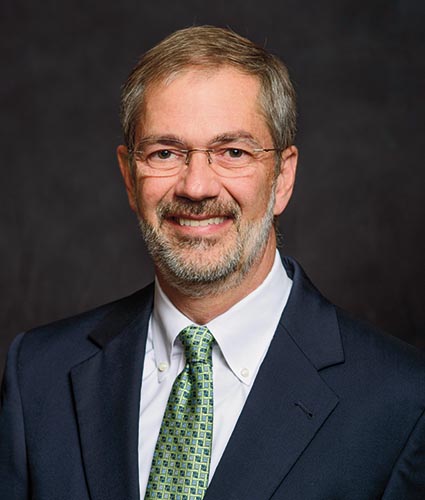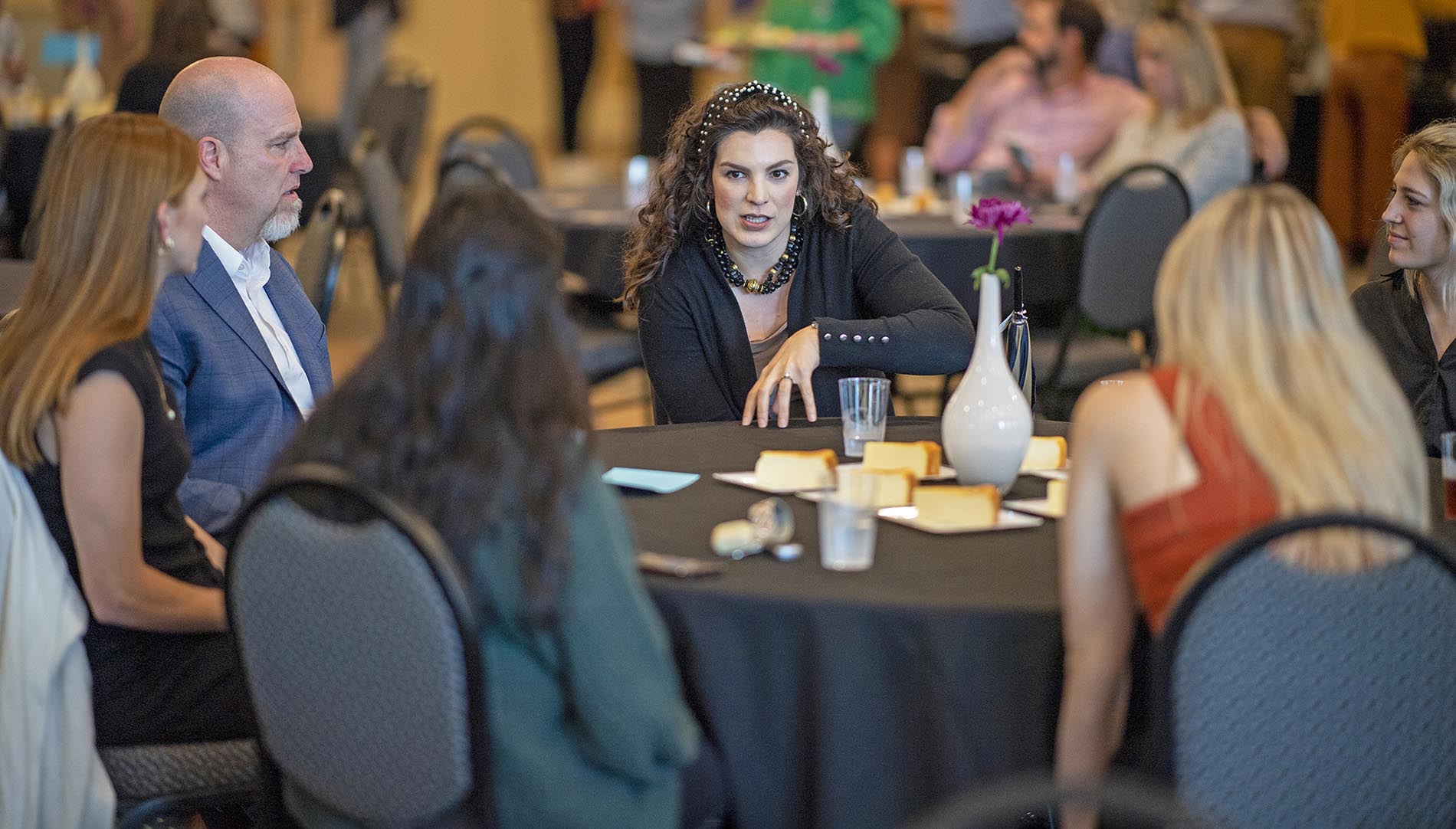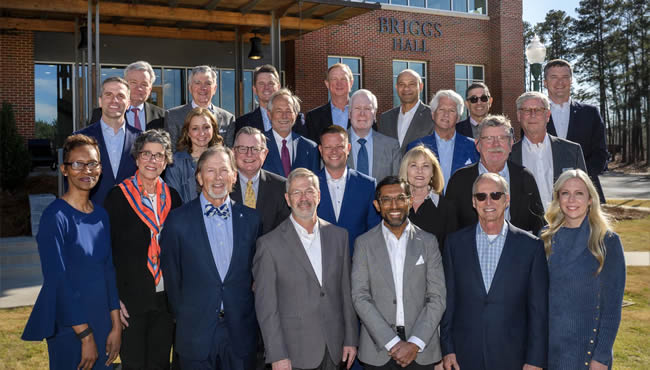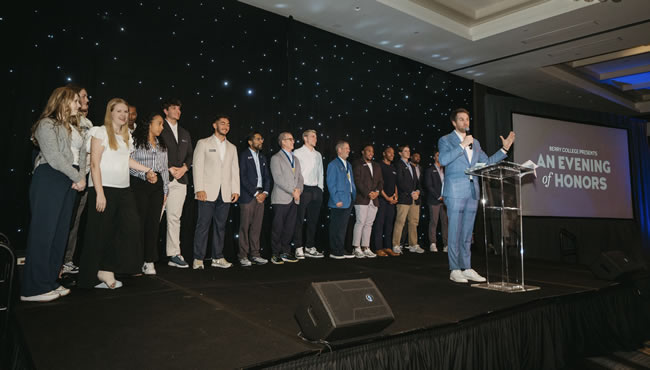
Dr. Stephen Briggs
Imagine yourself, a recent Berry graduate with an appealing first job as a user consultant for a successful software company. As you learn your craft, you become increasingly aware that the sales division regularly oversells its products, promising capabilities not yet available. This discrepancy is apparent as you strive to meet the expectations of your customers. What should you do when company culture tolerates (and compensates) behaviors that make you personally uncomfortable? Don’t most companies embellish the potential of products and features still in development? Isn’t that part of staying competitive? But how do you then respond to the frustration of your customers?
After retiring from his leadership role in the financial services industry, Cecil B. “Buster” Wright III (73C) felt compelled to help Berry students consider ethical issues of this sort before being confronted by them in the professional workplace. Buster studied other leadership programs at universities around the nation and became convinced that Berry could offer its own distinctive and practical program by connecting students directly with accomplished leaders – local men and women known for their character who exemplified Berry’s commitment to serve well the needs of others. And so was conceived the Berry Center for Integrity in Leadership and its mentoring program.
In the beginning
Ten years ago, an inaugural group of 50 juniors and seniors, in groups of five, were paired with 10 professionals from the Rome area. The program’s credibility was assured from the outset by the stature of these mentors: two physicians, a retired school superintendent, a retired state Supreme Court judge, a former mayor and a former pastor, as well as several business executives and a nonprofit leader. At first, as Trevor Sutton (14C) put it, “we had no clue what to expect.” But he soon realized BCIL could teach him how to translate lessons learned at Berry in ways that would have a strong impact after college. The substance of the program emerged in frank and open conversations about how to navigate tough decisions and difficult relationships.

Aaron Chastain (15C) remembers one night when his group discussed a scenario that seemed straightforward; the group quickly came to consensus on the “right” course of action. Then, as more details emerged, the group began to disagree as each person’s ethical boundaries became evident and were challenged. Members had to define for themselves an operating principle and wrestle with their moral compass or “true north.”
Now working as a senior investment advisor – and also serving as president of Berry’s Alumni Association – Aaron credits BCIL with helping him understand how critical it is to build trust in the workplace. In part, that means focusing on how everyday decisions impact others and looking downstream to anticipate the positive and negative effects of your actions.
Trust also means nurturing the relational tension required to work productively with others. As a research manager for user experience, Rachel LeRoy (15C) worked on a team to design innovative products. Each member had a different area of expertise, and the team’s success depended on collaboration. She pictures the work in terms of a trust exercise: “Everyone sits in a circle, holds hands and tries to stand up together. Everyone needs to pull equal weight to stand up gracefully. When one person pulls harder than the rest, the group will fall.”
Rachel learned from her BCIL experience to speak up tactfully but candidly when a member undercut the team by promoting his or her own goals and contributions above others.
By the numbers
The 50 students in the inaugural BCIL mentoring class have achieved considerable professional success. Nearly 60% have earned advanced degrees, including nine in medical fields ranging from physician practice to cardiovascular research; nine in management or marketing; and three each in information technology, talent acquisition and finance. In addition, there are teachers, writers and individuals working in government agencies. The BCIL mentoring program was meant to help students develop an ethical framework no matter their future career, and these alumni have indeed pursued divergent professional paths.
Reflecting on her experience, Charlotte Collins Davis (14C) remains impressed with the intentionality of the mentors, who were meticulous in their relationship-building and willingness to invest in Berry students. Now a professional in legislative affairs, she recognizes that it takes committed leadership to sustain institutions. Dr. Leah Bolden (15C), an internal medicine resident, remembers discussing ethically challenging medical cases in her BCIL group and now draws on principles learned as she leads a medical team and interacts with patients and families.
Soon after its inception, the mentoring program was endowed with a gift and became the Carper Mentoring Program in honor of a legendary history professor whose impact on students remains profound and lasting. Dr. Gordon Carper and his wife, Joyce, dedicated much of their lives to mentoring students in ways that, as one alumnus put it, “changed the course of our lives entirely and forever.”
As of this year, some 500 students have been selected for the Carper program; many were involved for two years, for a total of 928 student participants. They joined with 53 mentors to form 175 groups in 10 years. Having started with 10 groups (and 50 students) meeting twice monthly a decade ago, the program has grown to 22 groups and 132 students. New mentors participate each year (three in 2023), but many have participated multiple times, including six who have led eight or more groups: three members of Berry’s Board of Trustees [Dr. Brad Bushnell, Rick Gilbert (77c) and Buster Wright] and three respected members of the Rome community (Dr. Missy Dillmon, Sam Echols and Dr. Gayland Cooper).
A good name
In 2017, John Edward “Ed” Sims made a $2 million gift to honor his parents by endowing BCIL’s Elvin and Fleta Patterson Sims Directorship. His parents were both 1935 graduates of Berry College. The gift was inspired by his recognition of their lifelong work as community leaders in Georgia’s Turner and Dooly counties. While they lived modest lives – Elvin, as a school principal and part-time pastor, Fleta as a home economics teacher – they quietly and caringly shaped the character of their own two sons and countless others by their consistent emphasis on serving their community with integrity. The remarkable gift from Ed Sims ensures that generations of emerging leaders will have an opportunity to think deeply about issues of conviction and character as part of their Berry experience.

In summer 2022, Dr. Robert Reimer joined Berry as the Elvin and Fleta Patterson Sims Director, succeeding the inaugural director, Dr. Nate Pearson, who was appointed dean at a Florida university. A retired Air Force lieutenant colonel, Dr. Reimer is exceptionally well-qualified for the role, having served as director of the Leadership Core at the U.S. Air Force Academy. With a Ph.D. in industrial organizational psychology from Pennsylvania State University, his expertise lies in enhancing workplace performance through leadership and talent management.
The broader BCIL vision
Dr. Reimer was attracted to Berry by the opportunity to champion campus wide efforts to prepare students to be accountable, humbly confident and steadfast leaders of character. As he recently made clear to the Berry Board of Trustees, BCIL’s mentoring program is exemplary, a distinctive and compelling program that would be difficult to replicate elsewhere. However, extending the benefits of BCIL beyond current participation levels – 5% of Berry’s students – will require complementary programming.
One public and visible opportunity is the Cecil B. Wright III Lecture Series, which brings a major speaker to campus most every semester for an evening lecture, preceded by a dinner with students and special guests and often followed by a half-day of classroom visits. This March, the Berry College Chapel was full for a lecture by the acclaimed artist Makoto Fujimura, who described how beauty can emerge from brokenness in the context of a caring community.
In addition to drawing attention to issues of integrity, these lectures also introduce students to resources available through BCIL, including a more recent offering – the opportunity for Berry students to participate in the Collegiate Leadership Competition.
Other components of BCIL include the Kathy Brittain Richardson Fund for Faculty and Staff Development and the Buzz and Barbara Mote (61C) McCoy and Ted Owens funds supporting faculty in curricular development activities.
Dr. Reimer believes programs focused on faculty and staff development are especially important for extending BCIL’s reach and benefits to all students. Faculty and staff already have relational credibility with students, so it makes sense to invest in their skills as mentors whose impact will extend to generations of students.
Full circle
In an era when “selfies” are the defining feature of social media and we are encouraged to invest in our “personal brand,” how do we lean into Martha Berry’s vision for developing young people who will care deeply about the needs of others? How do we cultivate a “good neighbor mindset” and a community of belonging in keeping with the college’s enduring motto?
As a student, Amanda Preteroti (16C) – pictured at top – benefited from working through scenarios provided by Dr. Missy Dillmon and Dr. Brad Bushnell in her two years in the mentoring program. From Dr. Dillmon she learned to be attentive to the emotional and relational side of medicine, and with Dr. Bushnell she learned to be alert to the business aspects of medicine as well.
Amanda is now practicing locally as a physician assistant in the area of cardiology and has become the first BCIL graduate to return to the program as a mentor. While busy with the demands of her own professional life, Amanda – like Elvin and Fleta Sims and her own mentors – feels called to invest in the next generation of students as they climb the steep path of learning to lead with conviction and character.
She explains her passion simply.
“My BCIL mentors helped me think through how I would deal with ethical issues as a practicing clinician. I gained confidence in my judgment. And I remember how much it meant to have them walk alongside me during times of uncertainty. Their words of wisdom have stayed with me, and I am grateful and honored to lend an encouraging hand to others as they pursue their own Berry journey.”



